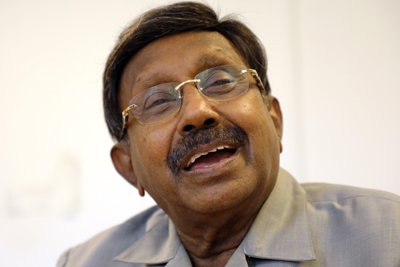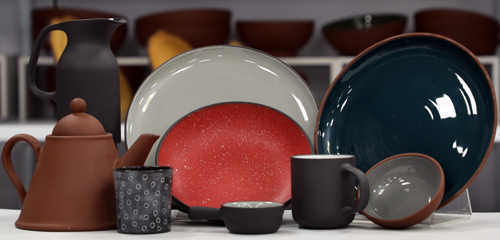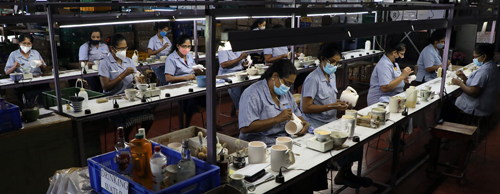Fulfilling a dream with a little help from a pen-pal

Dayasiri Warnakulasooriya
Pen-pal bonding as 14-year-olds across the wide seas looking eastward became the stepping stone for a pioneering venture in the 1960s which has stood the test of time and the challenges of the new coronavirus.
There is no need to search for the ‘bonikko’ factory, everyone knows it is down Shanthi Mawatha in Kottawa.
Humble have been the beginnings of the Midaya Ceramic Company Pvt. Limited., with just four people in a cadjan hut, more than 50 years ago in 1968, to what it is today with 230 staff, pulsating and throbbing with the whole gamut of the production line within it, sending out its beautiful handcrafted items to many destinations across the world.
One of the first Sri Lankans to export ceramic-ware to niche markets is Dayasiri Warnakulasooriya whose own tale is as fascinating as the business he built up against all odds. This Monday (March ![]() he celebrated his 82nd birthday.
he celebrated his 82nd birthday.
From the deep south of Walgammulla, Walasmulla, Dayasiri’s father was a small-time fish businessman who decided to relocate his family to Colombo in 1947.
A house he built down High Street (now W.A. Silva Mawatha) in Wellawatte became the family’s second home.
By “some fluke”, Dayasiri got admission to S. Thomas College (STC), Mount Lavinia, after doing well at the entrance examination, as his father set about establishing Ariyasinhe Stores, Ariyasinhe Drapery Stores and Ariyasinhe Hotel at Wellawatte.
Dayasiri who calls himself a “godaya” attracted by the swimming pool decided not to be a day scholar at STC but a boarder. So into Winchester House, he the son of a mudalali went, one of 28 boys in the 9-12 age-group, many from very affluent families.
During the holidays while his hostel mates headed for Nuwara Eliya or Yala, Dayasiri was expected by his Thaththa to kade weda karanna (work in the shop).

Contemporary look: A selection of tableware made by Midaya Pix by M.A. Pushpa Kumara
Those were the days when newspapers published names of children from other countries who wished to have Sri Lankan pen-friends and there began a bond with Akiko in Japan when he was 14.
Even as a little boy, Dayasiri realized that his father’s retail businesses were not sustainable as cooperatives began mushrooming in the vicinity. There was no future. His father’s shops stocked bulbs and ceramics too imported from England and Dayasiri toyed with the idea of setting up a bulb-manufacturing plant, but there was already one in Sri Lanka.
Seventeen-year-old Dayasiri then picked on ceramics. His father urged him to go to the United States of America (USA) and England to take a look at the industry. However, when he penned a letter to Akiko about his plans, her suggestion was simple.
“Why not come to Japan,” she suggested. Coincidentally, her father was the Vice President of a company exporting ceramics.
In 1960, Dayasiri sat his Senior School Certificate (SSC) examination from STC and headed by ship for Seto, a city in the Aichi Prefecture near Nagoya to master the art of ceramic-ware for eight years, with his father faithfully sending the princely sum of Rs. 350 (working out to about Yen 26,000) a month.
“I learnt my trade in ceramic factories, schools and industries,” he smiles, learning to speak Japanese fluently and also the vital importance of being punctual.
Returning to Sri Lanka not only with the art of ceramic-making ingrained in him but also with a pretty Japanese wife, Setsuko, who has been by his side, he went about setting up his business.
As he had predicted, his father’s business was on the wane and Dayasiri floated a company with seven, all kith and kin, experimenting with mosaic floor tiles and ceramic dolls, hence the name bonikko factory. By this time, the Japanese ceramic industry was facing tough times and Dayasiri came up with the initiative of making Sri Lanka a sub-contractor in triangular trade among Japan, Sri Lanka and USA.
Hurdles to his business came in different forms – securing a small order which would be his first export of ceramic ornamental-ware to the UK, he went in search of packaging.
Two box manufacturers refused point blank as the order was too small. Dayasiri recalls the disappointment with clarity even today and how armed with a bottle of whiskey he went to the Manager of one company and pleaded: “Please Sir, give us the boxes.”
He did get the boxes and sent off the small ceramic birds to the UK but it was also the day he decided to set up his own Midaya Packaging Industries (Pvt.) Limited, now a thriving business of its own.
Other challenges too Dayasiri has overcome, urgings by the other shareholders to sell up, when he took the decision to buy all the shares without giving up his dream.
A family tragedy he and his wife have faced with much heartache was when eldest son, Shantha, passed away suddenly after a heart attack.
Still very much a part of running his businesses though he has handed over much of the operations of the ceramics factory to his younger son Anura, the packaging factory to his second son Kumudu and his grandchildren run the Ramen Misoya Japanese restaurant, Dayasiri believes in giving back to the community, whether it is to Rotary projects (he is a very active member of the oldest Colombo Rotary Club), building pre-schools, providing essential equipment to hospitals or playing an active role in JASTECA (Japan Sri Lanka Technical & Cultural Association).
For all his good work, he has been honoured with ‘The Order of the Sacred Treasure, Gold Rays with Rosette’ by the Japanese government.
“We need to share,” smiles Dayasiri and that is what his family does for all workers under their wing – whether during a wedding or a funeral or very recently when the workers’ children needed devices to follow online classes.
There is though a tinge of sadness when he speaks of his children for he misses his daughter, Samantha, who now lives in Canada.
| A walk around the ‘bonikko’ factory | |
 While Dayasiri walks us through the production line, explaining that they get their raw material, feldspar from Matale and quartz from Ratnapura, son Anura says that they specialize in home and ‘horeca’ – hotel, restaurant and café – ornamental and utility ceramic-ware. While Dayasiri walks us through the production line, explaining that they get their raw material, feldspar from Matale and quartz from Ratnapura, son Anura says that they specialize in home and ‘horeca’ – hotel, restaurant and café – ornamental and utility ceramic-ware. As we walk around the factory, we see beautiful ornaments such as tigers and leopards, dogs in all their variety, sheep egg cups, candle-holders, vases, mugs and plates and more. Passed on from father to son, it is Anura who has taken the business to the next level exporting their “niche” and also “limited edition” products to many countries across the globe. Anura picks up two items – candle fills – and with pride says that theirs is the only factory in the world which has developed the technique to manufacture this unique item and export to China. “We are the original equipment manufacturers (OEM) for many brands such as Wedgwood, Royal Doulton, Iittala and Hay who hire us for our skills and provide us the designs. Ten percent are our designs which include our ‘earth’ (terracotta) and ‘titanium’ ranges,” says Anura. Smilingly, he concedes that he and his father always argue about what should be done, but the common ground on which they meet is quality.
|



